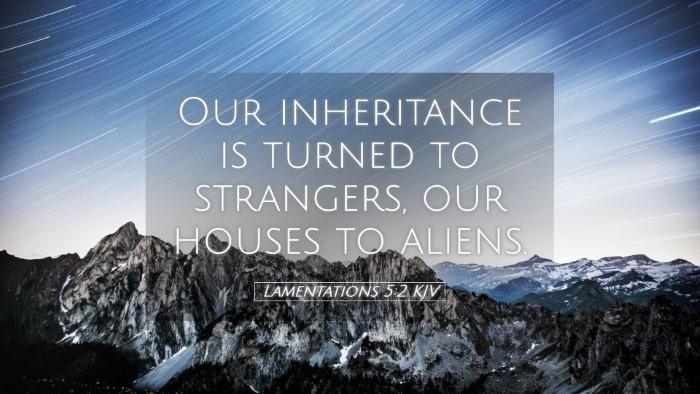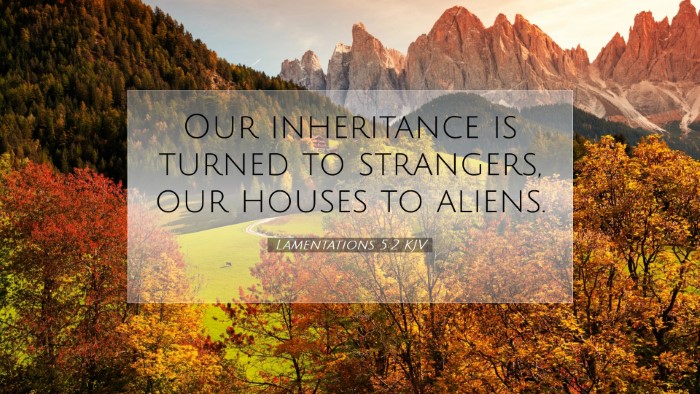Lamentations 5:2 - Commentary Summary
Lamentations 5:2 encapsulates the profound sense of loss and despair experienced by the people of Judah following the destruction of Jerusalem. The verse reads: "Our heritage is turned to strangers, our houses to aliens." This verse serves as a poignant reminder of the consequences of sin and the sorrow that accompanies God's judgment.
Contextual Overview
The Book of Lamentations is traditionally attributed to the Prophet Jeremiah, composed in the aftermath of the Babylonian exile. Lamentations is characterized by its acrostic structure and its haunting expressions of grief and mourning. As a reflection of the collective suffering of the Jewish people, this verse in particular highlights the deep personal and communal loss associated with the destruction of their homeland.
Thematic Insights
- Loss of Identity: Matthew Henry emphasizes that the term 'heritage' refers not only to physical properties but also to the spiritual and cultural legacy of a nation. The people of Judah lament that their very identity has been stripped away, replaced by strangers and foreigners.
- Divine Judgment: Albert Barnes notes that the alienation mentioned in the verse is a direct consequence of the Israelites' disobedience to God. Their abandonment of covenant faithfulness led to the loss of their God-given inheritance.
- Grief and Mourning: Adam Clarke poignantly reflects on the emotional aspect of this verse, suggesting that the mourning expressed is not just for physical loss but reflects a deeper spiritual desolation. This sorrow points to the human longing for a sense of belonging and inheritance that has been compromised.
Interpretative Insights
This verse resonates deeply with believers today as it underscores the significance of heritage in God's plan. The communal lament is a reminder that sin has universal ramifications—impacting not just individuals but entire communities and generations. The loss referenced in this verse mirrors experiences in which entire cultures or families may feel disconnected from their roots or heritage, prompting reflection on the importance of maintaining one’s spiritual and cultural identity.
Spiritual Lessons
- Understanding Heritage: The concept of 'heritage' in Scripture is multifaceted. It encompasses not just tangible possessions, but also the blessings, promises, and responsibilities given by God. Lamentations 5:2 serves as a reminder for believers to cherish and protect this legacy in their own lives.
- Awareness of Consequences: The verse serves as a sobering reflection on the serious consequences of turning away from God. It calls to mind the biblical truth that God’s correction comes as a loving act, aimed at restoring His people.
- Restoration and Hope: While Lamentations is often overshadowed by its themes of grief, it is important to note that the sorrow expressed does not exist in a vacuum. The longing for restoration and a return to God-reliance is a thread that runs throughout the text, suggesting that hope is always present, even in the darkest of times.
Pastoral Applications
For pastors and church leaders, Lamentations 5:2 provides a meaningful text to engage with communities facing loss or disenfranchisement. Here are several applications:
- Addressing Loss: Churches can create spaces for individuals and families to grieve their losses and understand their feelings through the lens of faith.
- Teaching on Heritage: Serams and discussions should explore what it means to have a God-given heritage, how to nurture it, and the importance of passing this legacy to future generations.
- Encouraging Restoration: Providing hope and a path forward for those who feel alienated can encourage relationships and the rebuilding of community under God’s direction.
Conclusion
The lament of Lamentations 5:2 serves as a powerful reminder of the enduring themes of loss, identity, and hope. By studying this verse in depth, individuals can gain insight into their own spiritual heritage, confront the reality of their circumstances, and find pathways toward restoration through faith and community.


